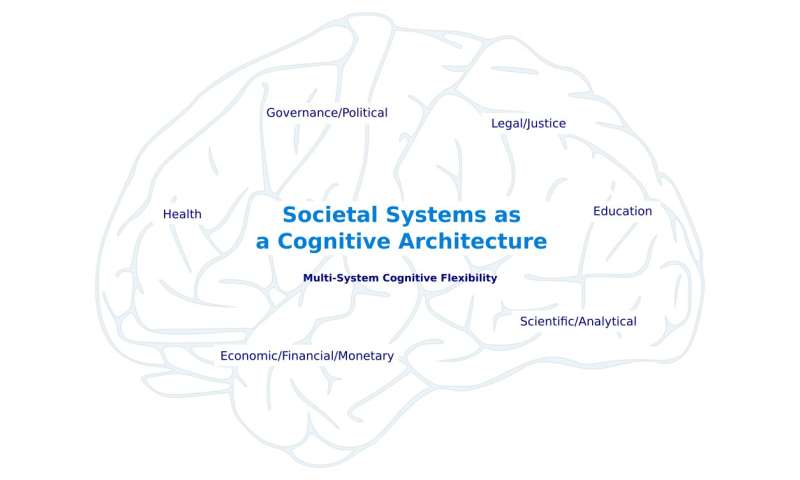Societal transformation: A role for second-order cognitive science?

Humanity faces profound, even existential threats from climate change and biodiversity loss and struggles to make progress on a host of other unsolved social and environmental problems. Increasingly, scientists, global policy experts and members of the general public conclude that bold, transformational change is needed across all sectors of society if we are to prevent catastrophe and improve social and environmental wellbeing. But how do we transform, and to what? And what role do science and scientists play?
In a series of three concept papers, recently published in Sustainability, I argue that science, especially second-order cognitive science (and related fields like complex system science and information theory) could play a key, even driving role in societal transformation. In first-order science, what we typically think of as science, the scientist is an observer and the goal is knowledge. Second-order science, in contrast, is explicitly normative and reflexive. The scientist is understood as part of the experiment, the aim is to affect change, and the effort is value-driven. With this distinction in mind, the title of the series is "Science-Driven Societal Transformation."
Cognitive science plays a critical role here, because our pressing problems are, in essence, cognitive ones. A remarkable characteristic about our problems is that they are old. Clear warnings about climate change, for example, started in the 1970s. In 1992, over 1,500 scientists, including 99 Nobel laureates, signed a document titled "World Scientists' Warning to Humanity." The first sentence reads "Human beings and the natural world are on a collision course." Unfortunately, that has not changed.
A second urgent warning was published in 2017, currently signed by more than 21,000 scientists, that highlights the lack of progress and the dangerous trajectories of key social and environmental indicators. Since the 1970s, numerous strategies, policies and reforms have been offered that could have reduced or prevented our current peril. But we did too little, too late. Why? It's as if our capacity as a society (and as a collection of societies) to think and act appropriately in the face of danger was somehow absent, or at least dangerously constrained. It's as if society is suffering from a cognitive dysfunction.
That notion, and the concept of society as a cognitive organism, is the starting point for the series. It proposes a novel, science-driven (evidence-based) R&D program aimed at societal transformation. More than a proposal, it offers a perspective and conceptual framework from which societal transformation might be understood and approached. That perspective, based on a synthesis of ideas from complex systems science, cognitive science, evolutionary biology and information theory, leans heavily on active inference, a Bayesian framework of cognition and biological self-organization. The goal of transformation, from this perspective, is to greatly improve societal cognition. The prescription offered is to develop and test fundamentally new societal systems (e.g., governance, economic and education systems) that excel as a cognitive architecture. A viable path to achieve widespread adoption is offered, in which implementation of new systems starts small, at the local community level, in field trials, and grow organically from there.
The series provides definitions, aims, reasoning, worldview, and a theory of change, and discusses fitness metrics and design considerations for new systems. In brief, it makes seven main arguments:
- Societal transformation is necessary if we are to avoid catastrophe and maintain and improve social and ecological wellbeing.
- One kind of societal transformation is the science-driven development of and migration to fundamentally new societal systems.
- A viable, affordable, practical R&D program could be initiated to achieve No. 2 within a reasonable span of time (a 50-year program is proposed that could lead to global-scale change).
- The proposed R&D program views society as a cognitive organism and its societal systems as a cognitive architecture. The program's goal is to design, test and implement new (de novo) societal systems that excel at societal cognition.
- The intrinsic purpose of a society, of societal cognition, and thus also of societal systems, is to achieve and sustainably maintain social and ecological vitality, broadly defined. Cognition is largely focused on reducing the uncertainty that our intrinsic purpose will be successfully fulfilled, both now and in the expected future.
- The cognitive view opens many new opportunities for research and should be considered in any R&D program aimed at societal transformation. Further, it is more likely to result in a society that fulfills its intrinsic purpose compared to other approaches (for example, goal-oriented approaches that seek to achieve target conditions of social and environmental wellbeing).
- The proposed R&D program, which is still conceptual, represents a partnership between local communities and the global science community. I recommend in the series that it start immediately and run concurrently with efforts to reform and innovate within existing societal systems.
This story is part of Science X Dialog, where researchers can report findings from their published research articles. Visit this page for information about ScienceX Dialog and how to participate.
More information: John C. Boik. Science-Driven Societal Transformation, Part I: Worldview, Sustainability (2020). DOI: 10.3390/su12176881
John C. Boik. Science-Driven Societal Transformation, Part II: Motivation and Strategy, Sustainability (2020). DOI: 10.3390/su12198047
John C. Boik. Science-Driven Societal Transformation, Part III: Design, Sustainability (2021). DOI: 10.3390/su13020726
John Boik, is courtesy faculty in the Environmental Sciences Graduate Program, Oregon State University, Corvallis, OR. His PhD is in biomedical sciences, from the University of Texas, Health Sciences Center, Houston, where he studied cancer biology. Postdoctoral work was conducted at Stanford University, Department of Statistics.